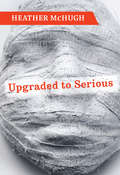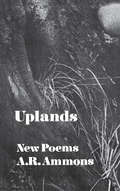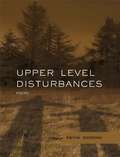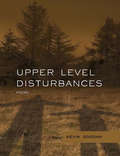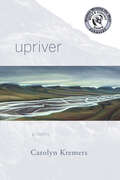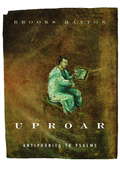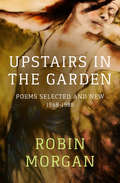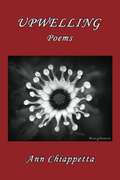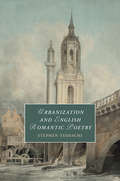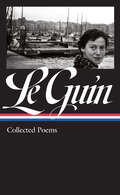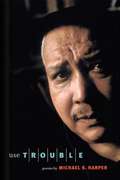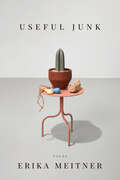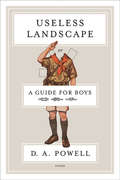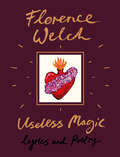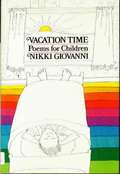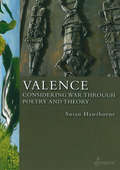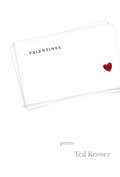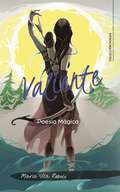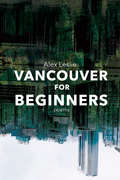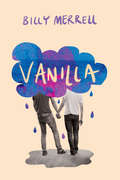- Table View
- List View
Upgraded to Serious
by Heather Mchugh"If McHugh is serious, she's anything but grim; with all her punning, bantering, and mock scolding of herself . . . she brightens the shadowy corners of her world with verbal pyrotechnics."-The New York Times Book Review"Her poems are open, resilient, invisibly twisted: part safety net, part trampoline."-Voice Literary SupplementThis fast-paced, verbally dexterous book-honored as a "Book of the Year" by Publishers Weekly-"boils up and boils over" as it utilizes medical terminology and iconography to work through loss and detachment. Heather McHugh's startling rhymes and rhythms, coupled with her sarcastic self-reflection and infectious laughter, serve as both palliative and prophylactic in the face of human sufferings and ignorance. Being "upgraded to serious" from critical condition is a nod to the healing powers of poetry."Not to Be Dwelled On"Self-interest cropped up even there,the day I hoisted three insteadof the ceremonially called-for twospadefuls of loamonto the coffin of my friend.Why shovel more than anybody else?What did I think I'd prove? More love(mud in her eye)? More will to work?(her father what, a shirker?) Christ,what wouldn't anybody giveto get that gesture back?She cannot die again; and Ido nothing but re-live.Heather McHugh is the author of a dozen books of poetry and translation. She teaches at the University of Washington and Warren Wilson College and lives in Seattle, Washington.
Uplands: New Poems
by A. R. AmmonsThis book collects many of the poems that A. R. Ammons wrote between 1964 and 1970. The poems here include brief lyrics and such longer works as "Summer Session 1968" and "Guitar Recicativos." The critic Harold Bloom writes, "With the publication of his Selected Poems (1968), soon after turning forty, A. R. Ammons quietly demonstrated a unique and central position in recent American poetry. . . . Recognition, as is always the case with a poetry difficult and central, has come slowly, but critics now begin to see in Ammons what he is: the maker of a body of poetry that fulfills Emerson's prophecy by addressing itself to life 'with sufficient plainness and with sufficient profoundness.'"
Upper Level Disturbances
by Kevin GoodanKevin Goodan's poems embody a quiet, incandescent fierceness, fueled by loss, but still able to seek and find a place to dwell, despite the upper level
Upper Level Disturbances (Mountain West Poetry Series)
by Kevin GoodanMountain West Poetry Series Published by the Center for Literary Publishing at Colorado State University
Upriver (The Alaska Literary Series)
by Carolyn KremersPoet, nonfiction writer, and lifelong musician Carolyn Kremers moved to Alaska to teach in the remote Bering Sea coast village of Tununak when she was thirty-four. Her first book, Place of the Pretend People: Gifts from a Yup’ik Eskimo Village (a memoir), probed and celebrated that experience. Upriver continues the chronicle of Kremers’ personal journey deep into Alaska and the human soul. Mixing music, Yup’ik language, the natural world, honesty, and an intimate sense of the spiritual and the unobtainable, Kremers presents a cascade of poems made of beauty and pain. The poems fall into five settings—Tununak, the Interior, Shape-Shifting, Return to the Y-K Delta, and Fairbanks. Like salmon swimming instinctively upriver—toward home—this story confronts what it means and how it feels to love a person or a place, no matter the consequences.
Uproar: Antiphonies to Psalms
by Brooks HaxtonIn this book of homemade psalms, Brooks Haxton brings the poetry of the original psalmists, their awe and their music, into our world of jet planes and space travel, automatic rifles and suburban pleasures. As he writes in his preface, "I take psalms less as doctrine than as outcries, and I cry back in these poems from whatever vantage I can find. " The result is lucid, touching verse that connects the exalted language of scripture with everyday experience. In a poem called "Dark," for example, Haxton riffs on the gorgeous line "The night also is thine" (Psalm 74) as he stands on his front stoop on a particularly black night. "Thou shalt make them drink of the river of thy pleasures" (Psalm 36) brings forth a poem about the perilous joy of bodysurfing. And his response to Psalm 58, "The righteous shall rejoice when he seeth the vengeance," becomes a poem about Westmoreland in Vietnam. These vibrant scraps of ancient text reverberate with intimations of the immediate present, and Haxton's poetry, in response, is fresh, funny, and tender. In the pain of doubt, and even in the burlesque of irreverence, he explores the mystery of our abiding passion for the sacred.
Upstairs in the Garden: Poems Selected and New, 1968–1988
by Robin MorganThe evolution of the poet who is one of feminism&’s greatest living voices Robin Morgan has always been one of the most original, technically skilled, and impassioned writers in American poetry, and Upstairs in the Garden shows the development of her distinctive voice. This book of selections from her previous volumes of poetry, plus new additions, summarizes the verse of two decades of iconoclastic work, and is an ideal starting place for a reader who wants to understand the nature of Morgan&’s oevre. Her intensity is infectious and stimulating, but ultimately her lyricism and empathy are what keep readers coming back to this volume again and again. There are blistering invectives that were quoted on feminist posters, buttons, and bumper stickers; poems so controversial they were banned in certain countries; and works so personal and vulnerable they lodge in the heart.
Upwelling: Poems
by Ann ChiappettaGuide dogs, death, and a disturbing dream. Marriage, memories, and intriguing mysteries. Eroticism, abortion, and a wonderfully poetic essay. In this collection of 23 of her short, accessible poems from several decades, Ann Chiappetta explores an enormous range of emotions and topics. "Orbituary" mourns the removal of an eye. "Verona" and "In Those Dark Moments" are tributes to her beloved guide dog. "Appearances" offers reflections on adjusting to blindness. Four of the poems deal with the illness and death of others and her enduring grief. "Root Cellar" is like a miniature horror movie. "The Marriage Pot" employs a much-used spaghetti pot as a symbol for the vicissitudes of a long marriage. "Helium" offers a balloon’s view of its surroundings. "NoneTheWiser" gives us the words of an unconventional little girl. These poems may variously pierce your heart or warm it, surprise you or amuse you. But they will surely move you and make for lasting memories. About the Author Ann Chiappetta holds a Master of Science degree in marriage and family therapy and currently practices as a readjustment counseling therapist for the Department of Veterans Affairs. She lives in New Rochelle, NY with her husband, daughter, and assorted pets. Her poems, articles, and short fiction have appeared in numerous online and print publications.
Urbanization and English Romantic Poetry (Cambridge Studies in Romanticism #117)
by Stephen TedeschiThrough an incisive analysis of the emerging debates surrounding urbanization in the Romantic period, together with close readings of poets including William Blake, William Wordsworth and Samuel Taylor Coleridge, Stephen Tedeschi explores the notion that the Romantic poets criticized the historical form that the process of urbanization had taken, rather than urbanization itself. The works of the Romantic poets are popularly considered in a rural context and often understood as hostile to urbanization - one of the most profound social transformations of the era. By focusing on the urban aspects of such writing Tedeschi re-orientates the relationship between urbanization and English Romantic poetry to deliver a study that discovers how the Romantic poets examined not only the influence of urbanization on poetry but also how poetry might help to reshape the form that urbanization could take.
Ursula K. Le Guin: Collected Poems (LOA #368)
by Ursula K. Le GuinAt last, a major American poet collected for the first time in the sixth volume of the definitive Library of Edition of her worksIn his last book, Harold Bloom presents the earthy, surprising, and lyrical poetry of Ursula K. Le GuinUrsula K. Le Guin&’s career began and ended with poetry. This sixth volume in the definitive Library of America edition of her works gathers, for the first time, her collected poems—from her earliest collection Wild Angels (1974) through her final publication, the collection So Far So Good, which she delivered to her editor just a week before her death in 2018. The themes explored in the poems gathered here resonate through all Le Guin&’s oeuvre, but find their strongest voice in her poetry: exploration as a metaphor for both human bravery and creativity, the mystery and fragility of nature and the impact of humankind on their environment, the Tao Te Ching, marriage, womanhood, and even cats. Le Guin&’s poetry is often traditional in form but never in style: her verse is earthy, surprising, and lyrical. Including some 40 poems never before collected, this volume restores to print much of Le Guin's remarkable verse. It features a new introduction by editor Harold Bloom, written before his death in 2019, in which he reflects on the power of Le Guin&’s poems, which he calls &“American originals.&” It also features helpful explanatory notes and a chronology of Le Guin&’s life.
Use Trouble
by Michael S. HarperFor decades, Michael S. Harper has written poetry that speaks with many voices. His work teems with poetry configured as awe, poetry as courtship, and poetry as elegy and homage. Infused with tales and riddles, sass and satire and surprise, Harper's poetry takes the form of psalms, jazz experiments, soft serenades, and radical provocations. In Use Trouble, his first major collection since Songlines in Michaeltree, Harper renews poetry as the art of taking nothing for granted. In three groups--"The Fret Cycle," "Use Trouble," and "I Do Believe in People"--he draws on his seemingly inexhaustible resources to paint, sing, sympathize, and sorrow. Here are his tributes to his father and family, his irrepressible playfulness, and his lifelong romance between poetry and music.
Useful Junk (American Poets Continuum Series #191)
by Erika MeitnerA master of documentary poetry, Erika Meitner takes up the question of desire and intimacy in her latest collection of poems.In her previous five collections of poetry, Erika Meitner has established herself as one of America’s most incisive observers, cherished for her remarkable ability to temper catastrophe with tenderness. In her newest collection Useful Junk, Meitner considers what it means to be a sexual being in a world that sees women as invisible—as mothers, customers, passengers, worshippers, wives. These poems render our changing bodies as real and alive, shaped by the sense memories of long-lost lovers and the still thrilling touch of a spouse after years of parenthood, affirming that we are made of every intimate moment we have ever had. Letter poems to a younger poet interspersed throughout the collection question desire itself and how new technologies—Uber, sexting, Instagram—are reframing self-image and shifting the ratios of risk and reward in erotic encounters.With dauntless vulnerability, Meitner travels a world of strip malls, supermarkets, and subway platforms, remaining porous and open to the world, always returning to the intimacies rooted deep within the self as a shout against the dying earth. Boldly affirming that pleasure is a vital form of knowledge, Useful Junk reminds us that our selves are made real and beautiful by our embodied experiences and that our desire is what keeps us alive.
Useless Landscape, or A Guide for Boys: Poems
by D. A. Powell*Winner of the 2012 National Book Critics Circle Award for Poetry*I have this rearrangement to make: symbolic death, my backward glance. The way the past is a kind of future leaning against the sporty hood. —from "Bugcatching at Twilight" In Useless Landscape, or A Guide for Boys - D. A. Powell's fifth book of poetry - the rollicking line he has made his signature becomes the taut, more discursive means to describing beauty, singing a dirge, directing an ironic smile, or questioning who in any given setting is the instructor and who is the pupil. This is a book that explores the darker side of divisions and developments, which shows how the interstitial spaces of boonies, backstage, bathhouse, or bar are locations of desire. With Powell's witty banter, emotional resolve, and powerful lyricism, this collection demonstrates his exhilarating range.
Useless Magic: Lyrics and Poetry
by Florence WelchLyrics and never-before-seen poetry and sketches from the iconic musician of Florence and the MachineSongs can be incredibly prophetic, like subconscious warnings or messages to myself, but I often don't know what I'm trying to say till years later. Or a prediction comes true and I couldn't do anything to stop it, so it seems like a kind of useless magic.
Vagupparai Charalgal - Azhagiya Thooralgalai...!
by Navin Raj ThangavelA collection of poems written by the author during his college days based on his feelings on love and other thoughts.
Valence: Considering War through Poetry and Theory
by Susan HawthorneValence in chemistry, the number of bonds in an element's atom in linguistics, the number of arguments controlled by a verbal predicate in psychology, the emotional charge something has In this remarkable annotated poem, Susan Hawthorne commits to words the horrors of war that have been left unspoken. She shatters the conspiracy of silence and dares to draw links between militarism, fundamentalism and the sex industry. She rails against the violence of war and contemplates the link between place and the history of war that is infused into the earth. With a fresh examination of her surroundings, she considers the endless cycle of war that survives on the persistence of hope--hope of an end to war, hope of an end to suffering. This is a hope that Susan Hawthorne does not ultimately share, but her courage in telling the truth about war through her poetry is a gift for readers.
Valentine Poems
by Myra Cohn Livingston"Roses are Red," "To-morrow Is Saint Valentine's Day," "Going Steady," "An Angry Valentine," "I Sow Hempseed," "My Love Is Like A Cabbage," "Plenty of Love," and others. From the serious to the silly, this is a fun selection of poetry. Other books by Myra Cohn Livingston are available in this library.
Valentines: Twenty-one Years Of Valentines, 1986-2006
by Ted KooserFor Valentine’s Day 1986, Ted Kooser wrote “Pocket Poem” and sent the tender, thoughtful composition to fifty women friends, starting an annual tradition that would persist for the next twenty-one years. Printed on postcards, the poems were mailed to a list of recipients that eventually grew to more than 2,500 women all over the United States. Valentines collects Kooser’s twenty-two years of Valentine’s Day poems, complemented with illustrations by Robert Hanna and a new poem appearing for the first time. Kooser’s valentine poems encompass all the facets of the holiday: the traditional hearts and candy, the brilliance and purity of love, the quiet beauty of friendship, and the bittersweetness of longing. Some of the poems use the word valentine, others do not, but there is never any doubt as to the purpose of Kooser’s creations.
Valerius Flaccus: Argonautica Book III (Cambridge Greek and Latin Classics #3)
by Gesine Manuwald Valerius FlaccusValerius Flaccus' Argonautica is one of the most significant surviving works of Flavian epic, which has recently become much more popular as a field of study and teaching in Latin literature. This is the first commentary in English directly tailored to the needs of graduate and advanced undergraduate students. It provides an introduction to the major themes of the poem and the structure and content of Book III in particular which can function as an overview of the key features of Flavian epic. The detailed commentary on Book III discusses linguistic issues, intertextual and mythical allusions and thematic strands. The book consists of two major episodes in the adventures of Jason and the Argonauts which can be read together or independently of each other. First accessible commentary in English on an interesting book of this Flavian epic. Provides all the information required for the student to read and understand the Latin. Encourages comparison with other Latin epics more familiar to students.
Valiente: Poesía Mágica
by María Vila ReboloPoesía mágica para caminar sin miedos. Aquí dentro, el agua de lluvia reparte bondad, hay un cuaderno en blanco bajo el sol de otoño, aquí dentro está tu historia de estrella con una vida de seda. Súbete a este pino para practicar voto de silencio porque, muchas veces, es mejor escribir que hablar.
Vancouver for Beginners
by Alex LeslieIn Vancouver for Beginners, the nostalgia of place is dissected through the mapping of a city where readers are led past surrealist development proposals, post-apocalyptic postcards, childhood landmarks long gone and a developer who paces at the city's edge, shoring it up with aquariums.In these poems you will traverse a city lined with rivers, not streets. Memory traps and tourist traps reveal themselves, and the ocean glints, elusive, in the background. Here there are many Vancouvers and no Vancouver, a city meant for elsewhere after the flood has swept through. This place of the living and the dead has been rewritten: forests are subsumed by parks, buildings sink and morph, and the climate has changed.Vancouver for Beginners is a ghost story, an elegy, a love song for a city that is both indecipherable and a microcosm of a world on fire.
Vancouver for Beginners
by Alex LeslieWinner of the 2020 Western Canada Jewish Book Awards, The Lohn Foundation Prize for PoetryIn Vancouver for Beginners, the nostalgia of place is dissected through the mapping of a city where readers are led past surrealist development proposals, post-apocalyptic postcards, childhood landmarks long gone and a developer who paces at the city's edge, shoring it up with aquariums.In these poems you will traverse a city lined with rivers, not streets. Memory traps and tourist traps reveal themselves, and the ocean glints, elusive, in the background. Here there are many Vancouvers and no Vancouver, a city meant for elsewhere after the flood has swept through. This place of the living and the dead has been rewritten: forests are subsumed by parks, buildings sink and morph, and the climate has changed.Vancouver for Beginners is a ghost story, an elegy, a love song for a city that is both indecipherable and a microcosm of a world on fire.Praise for Alex Leslie:"Alex Leslie is a tremendously gifted and compassionate writer. This bold and searing collection is a wonder." —Madeleine Thien, Scotiabank Giller Prize winning author of Do Not Say We Have Nothing"A magnetic collection that must be read over and over." —Kirkus Reviews
Vanilla
by Billy MerrellA bold, groundbreaking novel about coming out, coming into your own, and coming apart.Vanilla and Hunter have been dating since seventh grade. They came out together, navigated middle school together, and became that couple in high school that everyone always sees as a couple. There are complications and confusions, for sure. But most of all, they love each other.As high school goes, though, and as their relationship deepens, some cracks begin to show. Hunter thinks they should be having sex.Vanilla isn't so sure. Hunter doesn't mind hanging out with loud, obnoxious friends.Vanilla would rather avoid them. If they're becoming different people, can they be the same couple?Falling in love is hard.Staying in love is harder.
Vapor: Poems
by Sara Eliza JohnsonSara Eliza Johnson’s much-anticipated second collectiontraces human emotion and experience across a Gothic landscape of glacial and cosmic scale. With a mind informed by physics, and a heart yearning for sky burial, Vapor’s epic vision swerves from the microscopic to telescopic, evoking an Anthropocene for a body and planet that are continually dying: “So alone / I open like a grave,” Johnson chronicles her love for “all this emptiness, this warp and transparence, the whorl of atoms I brush from your brow,” and considers how “each skull, / like a geode, holds a crystal colony inside.” Almost omnipresently, Vapor stitches stars to microbes, oceans to space, and love to pain, collapsing time and space to converge everything at once. Blood and honey, fire and shadow, even death and mercy are secondary to a profoundly constant flux. Facing sunlight, Johnson wonders what it would mean to “put my mouth to its / mouth, suck the fluid / from its throat, and give / it my breath, my skin, / which was once my / shadow,” while elsewhere the moon “is molten, an ancient red, and at its bottom is an exit wound that opens into another sea, immaculate and blue, that could move a dead planet to bloom.”In Vapor, Sara Eliza Johnson establishes herself as a profound translator of the physical world and the body that moves within it, delivering poems that show us how to die, and live.
